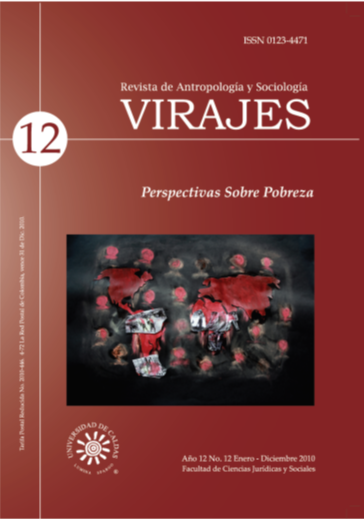Authors
Abstract
In Colombia, as in most of the poor countries, the development of countryside lifestyle has always been associated with extreme poverty conditions. Although the major part of the current exploitation of rural areas occurs from the penetration of industrial and financial capital, those who have traditionally derived their sustenance from activities in this area either as owners or as suppliers of required labor have been invariably linked to shortage. The coffee harvesters, who constitute the most important link in the production of grain, do not escape to this relationship; on the contrary, they could be the ones who presently best embody the condition of rural poverty. This situation appears in the social representations set by collectors about their being and the occupation they have, as a factor directly responsible for their location in the social scale and, of course, in the economic scale. Representations of the coffee harvesters around themselves and around the role they have, account for the ambivalence regarding the consideration of poverty as a permanent or temporary state. Sometimes it is presented as a defining element of their configuration that, in a constant and inevitable manner they will reproduce from their occupation; some other times, they assume it as a reality which they will be able to rise and overcome.
Keywords:
References
ARAYA, Sandra. (2002). “Las representaciones sociales. Ejes teóricos para su discusión”. Cuadernos de Ciencias Sociales, 127. En: http://flacso.or.cr/fileadmin/documentos/FLACSO/Cuaderno127.pdf [Julio de 2010].
BANCO MUNDIAL. (2000). Informe sobre el desarrollo mundial 2000/2001. Lucha contra la pobreza (panorama general). Washington, D.C.: Banco Mundial.
BERGER, Peter & LUCKMANN, Thomas. (1991). La Construcción Social de la Realidad. Buenos Aires: Amorrortu.
BERGQUIST, Charles. (1988). Los Trabajadores en la Historia Latinoamericana. Estudio Comparativo de Argentina, Chile, Colombia y Venezuela. Bogotá: Ed. Siglo XXI.
DUQUE, Hernando; RESTREPO, Marino & VELÁSQUEZ, Ricardo. (2000). Estudios sobre cosecha de café y mano de obra en Palestina, Caldas. CENICAFÉ.
FEDER, Ernest. (1980). “Capital monopólico y empleo agrícola en el tercer mundo”. En: Cuadernos políticos, 26. México.
GÓMEZ, Sergio & KLEIN, Emilio. (1993). Los pobres del Campo: el trabajador eventual. Santiago: FLACSO – PREALC.
GUBER, Rosana. (2004). El salvaje metropolitano. Buenos Aires: Paidós.
JODELET, Denise. (1986). “La representación social: fenómeno, concepto y teoría”. En: MOSCOVICI, S. (Ed.). Psicología social II. Barcelona: Paidós.
JUNGUITO, Roberto & PIZANO, Diego. (1991). “El café y el desarrollo histórico de la economía colombiana”. En: JUNGUITO, Roberto & PIZANO, Diego (Coords.). Producción de café en Colombia. Bogotá. FEDESARROLLO y FEDERACAFÉ.
LANDA, María Inés & MARENGO, Leonardo. (2010). “La metabolización de los cuerpos en el capitalismo avanzado”. En: www.unse.edu.ar/trabajoysociedad [Julio 25 de 2010].
LARA, Sara María. (2001). “Análisis del mercado de trabajo rural en México en un contexto de flexibilización”. En: GIARRACA, Norma (Comp.). Una nueva ruralidad en América Latina? Buenos Aires: CLACSO.
PALACIOS, Marcos. (1979). El café en Colombia (1850-1970). Una historia económica, social y política. Bogotá: Ed. Presencia Ltda.
RAMÍREZ, Juan Carlos. (1983). “Los andariegos. Una relación socioeconómica”. En: Cuadernos de agroindustria y economía rural, 11. Segundo semestre.
SEN, Amartya. (2000). Desarrollo y libertad. Barcelona: Editorial Planeta.
TOBASURA, Isaías. (1994). “Algunos factores que afectan la oferta y la demanda de fuerza de trabajo rural en la zona cafetera del departamento de Caldas”. En: Agronomía, No. 6, Vol. 3. Manizales: Universidad de Caldas.
TOBASURA, Isaías & RESTREPO, Luis Fernando. (1991). “Características socioeconómicas del recolector temporal de café en el municipio de Chinchiná, Caldas”. En: Agronomía, No. 4, Vol. 1. Manizales: Universidad de Caldas.
VERGARA, María del Carmen. (2008). “La naturaleza de las representaciones sociales”: En: Revista Latinoamericana de Ciencias Sociales, Niñez y Juventud, No. 6, Vol. 1. Manizales: Universidad de Manizales.

 PDF (Español)
PDF (Español)
 FLIP
FLIP














